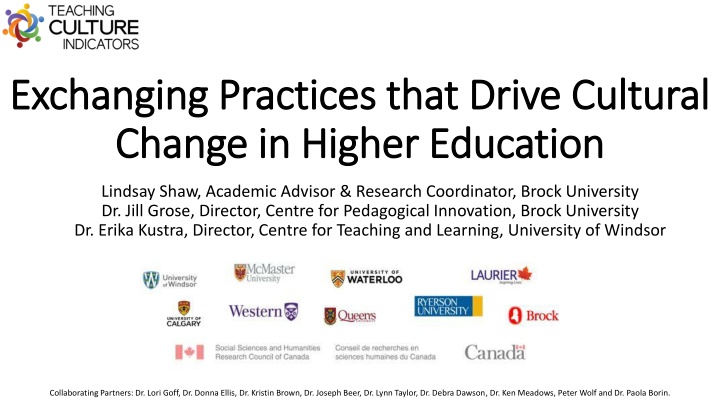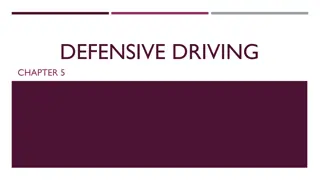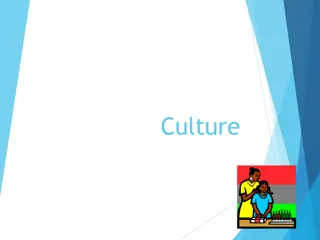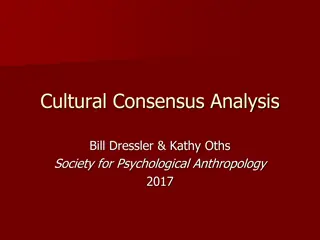Driving Cultural Change in Higher Education
Teaching Culture Project explores the impact of cultural practices on productivity, engagement, and learning in universities. Collaborative research initiatives focus on understanding teaching cultures through surveys and strategic initiatives.
Download Presentation

Please find below an Image/Link to download the presentation.
The content on the website is provided AS IS for your information and personal use only. It may not be sold, licensed, or shared on other websites without obtaining consent from the author.If you encounter any issues during the download, it is possible that the publisher has removed the file from their server.
You are allowed to download the files provided on this website for personal or commercial use, subject to the condition that they are used lawfully. All files are the property of their respective owners.
The content on the website is provided AS IS for your information and personal use only. It may not be sold, licensed, or shared on other websites without obtaining consent from the author.
E N D
Presentation Transcript
Exchanging Practices that Drive Cultural Exchanging Practices that Drive Cultural Change in Higher Education Change in Higher Education Lindsay Shaw, Academic Advisor & Research Coordinator, Brock University Dr. Jill Grose, Director, Centre for Pedagogical Innovation, Brock University Dr. Erika Kustra, Director, Centre for Teaching and Learning, University of Windsor Collaborating Partners: Dr. Lori Goff, Dr. Donna Ellis, Dr. Kristin Brown, Dr. Joseph Beer, Dr. Lynn Taylor, Dr. Debra Dawson, Dr. Ken Meadows, Peter Wolf and Dr. Paola Borin.
1. Introduction: Teaching Culture Project 1. Introduction: Teaching Culture Project 2. Purpose: The Repository 2. Purpose: The Repository 3. Current State: The Repository 3. Current State: The Repository Outline Outline 4. Exchange of Practice 4. Exchange of Practice 5. Cultural Implications of the Practices 5. Cultural Implications of the Practices 6. Opportunity to Submit a Practice 6. Opportunity to Submit a Practice
Teaching Culture is the product of a dynamic interplay among the embedded patterns, behaviours, values, beliefs and ideologies about teaching and learning that exist within and across the many microcultures that make up a contemporary university. (Cox et al., 2011; Kustra et al. 2014; M rtensson & Rox , 2016). Teaching Culture can impact critical outcomes such as: Staff Productivity Student Engagement Faculty Motivation Student Retention Student Learning (Harter et al, 2003; Lok & Crawford, 2004) (Feldman & Paulsen, 1999) (Cox et al., 2011) (Cox et al., 2011) (Grayson & Grayson, 2003) This project was supported by an Educational Developers Caucus Grant of the Society for Teaching and Learning in Higher Education.
Teaching Culture Project Overview Teaching Culture Project Overview A group of educational researchers developed a set of three Institutional Teaching Culture Perception Surveys (ITCPS) to capture a snapshot of teaching culture in a particular time frame, providing institutions with feedback on six levers (H nard & Roseveare, 2012; Kustra et al., 2014). The surveys gather perceptions from staff, faculty and students. In 2016-18 surveys were released in two phases at 7 institutions across Canada funded by a SSHRC Insight Development Grant. Analysis and validation of surveys is on-going. To read more about the project and other presentations, visit our website: https://qualityteachingculture.wordpress.com/
1. Institutional Strategic Documents and Initiatives Prioritize Effective Teaching (Association of American Universities, 2013; Gibbs et al., 2008) Teaching is considered a priority in the strategic plan, effective teaching is clearly defined in institution-wide documents, senior administrators convey that teaching is a priority etc. 2. Assessment of Teaching is Constructive and Flexible (Arreola, 2007; Kaplan, 2018; Wright et al., 2014) Students are invited to provide feedback, student evaluations are taken into consideration in hiring promotion and tenure, instructors have some influence over how teaching is assessed, etc. 3. Effective Teaching is Implemented (Jawitz & Perez, 2016; Riddell & Haigh, 2015) Levers Levers (H nard & Roseveare, 2012; Kustra et al., 2014) Instructors adopt a wide variety of approaches to teaching and learning, instructors are encouraged to use evidence to inform teaching, instructors access services and resources etc. 4. Infrastructure Exists to Support Teaching (Finkelstein et al., 2016; Jamieson, 2003) Learning spaces are designed to support learning, instructors have access to resources, instructors can get financial support, instructors use technology to support student learning etc. 5. Broad Engagement Occurs Around Teaching (Jawitz & Perez, 2016; Williams et al., 2013) Students are involved in activities that foster effective teaching, external stakeholders are involved in initiatives, teaching practices are discussed across the institution etc. 6. Effective Teaching is Recognized and Rewarded (Dennin et al., 2017) There are institutional rewards, teaching accomplishments are publicized, teaching is valued in the hiring process, there is institutional recognition for staff who support teaching etc. This project was supported by an Educational Developers Caucus Grant of the Society for Teaching and Learning in Higher Education.
Facilitated Conversation: Part 1 Facilitated Conversation: Part 1 What kind of teaching culture do you see at your institution?
The Repository Overview The Repository Overview Designed as a companion resource to the ITCP surveys. Provide ideas for how we might strengthen a particular lever to enhance teaching culture. Practices were gathered through listservs, conference presentations and word-of-mouth requests. Some of the practices identified will have been formally assessed for their impact; some are applications of established theory or research evidence; while others represent the wisdom of practice developed in an individual institution or discipline. Practices will be relevant to enhancing more than one lever. Open to multiple applications and adaptations, depending on local context. The repository is expected to be released in September 2019. Guiding Principles Teaching Culture Matters Context Matters Collaboration Focus on Learning This project was supported by an Educational Developers Caucus Grant of the Society for Teaching and Learning in Higher Education.
Repository Repository Examples Examples This project was supported by an Educational Developers Caucus Grant of the Society for Teaching and Learning in Higher Education.
Repository Repository Examples Examples This project was supported by an Educational Developers Caucus Grant of the Society for Teaching and Learning in Higher Education.
Repository Repository Examples Examples This project was supported by an Educational Developers Caucus Grant of the Society for Teaching and Learning in Higher Education.
Facilitated Conversation: Part 2 Facilitated Conversation: Part 2 Are there practices at your institution that you think contribute to a positive teaching culture? This project was supported by an Educational Developers Caucus Grant of the Society for Teaching and Learning in Higher Education.
Facilitated Conversation: Part 3 Facilitated Conversation: Part 3 How might this online repository benefit your work? This project was supported by an Educational Developers Caucus Grant of the Society for Teaching and Learning in Higher Education.
Opportunity to Participate in the Repository Opportunity to Participate in the Repository Repository Form: https://uwindsor.ca1.qualtrics.com/jfe/form/SV_5alM43PUjutgi8J Alternative Location: https://qualityteachingculture.wordpress.com/effective-practices-repository/ Paper Forms Also Available* This project was supported by an Educational Developers Caucus Grant of the Society for Teaching and Learning in Higher Education.
Lindsay Shaw, MA Lindsay Shaw, MA Project Coordinator, Brock University Project Coordinator, Brock University lshaw2@brocku.ca lshaw2@brocku.ca Erika Kustra, PhD Erika Kustra, PhD Project Lead, Teaching Culture Indicators (Larger Project) Project Lead, Teaching Culture Indicators (Larger Project) Director, Centre for Teaching and Learning, University of Windsor Director, Centre for Teaching and Learning, University of Windsor kustraed@uwindsor.ca kustraed@uwindsor.ca Contacts Contacts Jill Grose, PhD Jill Grose, PhD Project Lead, Repository of Effective Practices (Sub Project) Project Lead, Repository of Effective Practices (Sub Project) Director, Centre for Pedagogical Innovation, Brock University Director, Centre for Pedagogical Innovation, Brock University jgrose@brocku.ca jgrose@brocku.ca This project was supported by an Educational Developers Caucus Grant of the Society for Teaching and Learning in Higher Education.
References References Association of American Universities. (2013). Framework for systemic change in undergraduate STEM teaching and learning. Retrieved from: https://www.aau.edu/sites/default/files/STEM%20Scholarship/AAU_Framework.pdf Arreola, R. A. (2007). Developing a comprehensive faculty evaluation system: A guide todesigning, building, and operating large-scale faculty evaluation systems (3rd ed.). Bolton, MA: Anker. Cox, B.E., McIntosh, K.L., Reason, R.D., & Terenzini, P.T. (2011). A culture of teaching: Policy, perception, and practice in Higher Education. Research in Higher Education, 52, 808-829. Dennin, M., Schultz, Z.D., Feig, A., Finkelstein, N., Greenhoot, A.F., Hildreth, M., Miller, E.R. (2017). Aligning practice to policies: Changing the culture to recognize and reward teaching at research universities. CBE- Life Sciences Education, 16(5), 1-8. https://doi.org/10.1187/cbe.17-02-0032 Finkelstein, A., Ferris, J. Weston, C., & Winer, L. (2016). Research-informed principles for (re)designing teaching and learning spaces. Journal of Learning Spaces, 5(1), 26-40. Retrieved from http://libjournal.uncg.edu/jls/article/view/1213/909 Gibbs, G., Habeshaw, T., & Yorke, M. (2000). Institutional learning and teaching strategies in English higher education. Higher Education, 40, 351-372. https://doi.org/10.1023/A:1004148310182 Gibbs, G., Knapper, C., & Piccinin, S. (2008). Disciplinary and contextually appropriate approaches to leadership of teaching in research-intensive academic departments in higher education. Higher Education Quarterly, 62(4), 416-436. https://doi.org/10.1111/j.1468-2273.2008.00402.x Ginsberg, S.M., & Bernstein, J.L. (2011). Growing the scholarship of teaching and learning through institutional culture change. Journal of Scholarship of Teaching and Learning,11, 1-12. Grayson, J.P., & Grayson, K. (2003). Research on retention and attrition (No. 6). Montreal QC: The Canadian Millennium Scholarship Foundation. Harter, J.K., Schmidt, F.L., & Keyes, C. L. (2003). Well-being in the workplace and its relationship to business outcomes: A review of the Gallup studies. In C.L.M. Keyes & J. Haidt (Eds.), Flourishing: The positive person and the good life (pp. 205 224). H nard, Fabrice, and Deborah Roseveare. Fostering quality teaching in higher education: Policies and Practices. An IMHE Guide for Higher Education Institutions (2012): 7-11. Jamieson, P. (2003). Designing more effective on-campus teaching and learning spaces: A role for academic developers. The International Journal for Academic Development, 8(1), 119-133. Jawitz, J. & Perez, T. (2016). Investing in teaching development: Navigating risk in a research intensive institution. International Journal for Academic Development, 21(3), 194-205. https://doi.org/10.1080/1360144X.2015.1081852 Kustra, E., Doci, F., Gillard, K., Discke-Hondzel, C., Goff, L., Gabay, D., & Hughes, S. (2015). Teaching culture perception: documenting and transforming institutional teaching cultures. Collected Essays on Learning and Teaching: Transforming Our LearningExperiences, 8, 231-244. Kustra, E., Doci, F., Meadows, K.N., Dawson, D., Dishke-Honzel, C., Goff, L., Hughes, S. (2014). Teaching culture indicators: Enhancing quality teaching. Report to the Ministry of Training, Colleges and Universities Productivity and Innovation Fund Program, University of Windsor, ON. Lok, P., & Crawford, J. (2004). The effect of organisational culture and leadership style on job satisfaction and organisational commitment: A cross-national comparison. Journal ofManagement Development, 23(4), 321-338. https://doi.org/10.1108/02621710410529785 Kaplan, W. (2018). In the matter of an interest arbitration. Retrieved from: https://www.canlii.org/en/on/onla/doc/2018/2018canlii58446/2018canlii58446.html. M rtensson, K., & Rox , T. (2016). Leadership at a local level- enhancing educational development. Educational Management Administration and Leadership, 44(2), 247. 262. https://doi.org/10.1177/1741143214549977 Miller-Young, J.E., Anderson, C., Kiceniuk, D., Mooney, J., Riddell, J., Schmidt Handbidge, A., Chick, N. (2017). Leading up in the scholarship of teaching and learning. TheCanadian Journal for the Scholarship of Teaching and Learning, 8(2). https://doi.org/10.5206/cjsotl-rcacea.2017.2.4 Rawn, C., & Fox, J.A. (2018). Understanding the work and perceptions of teaching focused faculty in a changing academic landscape. Research in Higher Education, 59(5), 591- 622. https://doi.org/10.1007/s11162-017-9479-6 Riddell, J., & Haigh, C.A. (2015). Preaching what we practice: How institutional culture supports quality teaching. Journal of Eastern Township Studies, 44, 15-33. Shaw, L., Brown, K., Ellis, D., Wolf, P., Dawson, D., & Kustra, E. (in press). From perception to practice: A qualitative exploration into institutional teaching culture. Collected Essays on Learning and Teaching. Stensaker, Bjorn. (2017). Academic development as cultural work: responding to the organizational complexity of modern higher education institutions. International Journal for Academic Development, 23(4), 274-285. Williams, A.L., Verwoord, R., Beery, T.A., Dalton, H., McKinnon, J., Strickland, K., Poole, G. (2013). The power of social networks: A model for weaving the scholarship of teaching and learning into institutional culture. Teaching and Learning Inquiry: The ISSOTLJournal, 1(2), 49-62. https://doi.org/10.20343/teachlearninqu.1.2.49 Wright, W.A., Mighty, J., Muirhead, B., Scott, J., & Hamilton, B. (2014). The OntarioUniversities teaching evaluation toolkit: A feasibility study. Report to the Ministry of Training, Colleges and Universities Productivity and Innovation Fund Program. University of Windsor: Windsor, ON.























